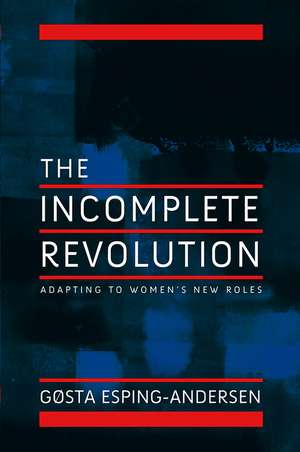The Incomplete Revolution – Adapting Welfare States to Women′s New Roles
Autor G Esping–Andersenen Limba Engleză Hardback – 23 iul 2009
In this new book G sta Esping-Andersen - the leading analyst of the welfare state - examines how different societies have responded to these challenges. It focuses especially on the quest for gender equality, on the role of families in the reproduction of social inequalities, and on major inequities associated with an ageing population. Through comparative analysis he seeks to identify the kinds of welfare state reform that can optimize not only individuals' life chances but also collective welfare. The intellectual ambition is, in other words, to identify the mainsprings of a new and superior form of social equilibrium.
This book will be of great interest to anyone concerned with gender and the changing role of women, with social and public policy, and with the future of the welfare state.
Preț: 431.50 lei
Preț vechi: 507.64 lei
-15% Nou
Puncte Express: 647
Preț estimativ în valută:
82.58€ • 85.69$ • 69.02£
82.58€ • 85.69$ • 69.02£
Carte tipărită la comandă
Livrare economică 15-29 martie
Preluare comenzi: 021 569.72.76
Specificații
ISBN-13: 9780745643151
ISBN-10: 0745643159
Pagini: 200
Dimensiuni: 164 x 237 x 20 mm
Greutate: 0.45 kg
Editura: Polity Press
Locul publicării:Chichester, United Kingdom
ISBN-10: 0745643159
Pagini: 200
Dimensiuni: 164 x 237 x 20 mm
Greutate: 0.45 kg
Editura: Polity Press
Locul publicării:Chichester, United Kingdom
Public țintă
Advanced undergraduates, graduates and scholars in sociology, social policy, politics and related disciplines; policy makers and interested general readersCuprins
Descriere
Focuses especially on the quest for gender equality, on the role of families in the reproduction of social inequalities, and on major inequities associated with an ageing population. This title seeks to identify the kinds of welfare state reform that can optimize not only individuals' life chances and also collective welfare.
